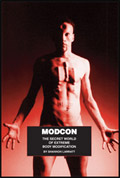…sorry I'm not writing much here, I'm currently in the process of rewriting all of the FAQs on BME so all my writing energies are being used up. Right now I'm tackling the horribly out of date, extremely limited, and quite possibly irresponsible “home surgery advice faq”, now retitled the “Elective Home Surgery FAQ”.
From the introduction:
Q: Why home surgery?The "legitimate" medical community has a remarkably limited range of elective procedures that they are able to offer without facing intense scrutiny and potentially sanctions from their peers. As such, there are a myriad of procedures (including atypical implants, transdermal implants, subincisions, silicone injections, castration, and amputation to name only a few) that are unavailable using the Western medical industry.
As such, people are left with a limited number of options including not getting the procedure at all, doing it themselves, seeking the assistance of an "underground" practitioner (possibly medically trained, but more than likely not), or travelling to a doctor in a country where doctors are not as restricted.
Q: What is this FAQ about?
This FAQ is designed to expose readers to some of the issues involved with performing surgical procedures in a non-medical environment with largely untrained practitioners. This document is not intended as a training guide, and in no way does reading a document like this make a person qualified to perform these procedures.
That said, the vast majority of -- and perhaps all -- practitioners serving the body modification community, be they piercers or be they implanters, fall into the category of "home surgeon" in that they are performing what are arguably pseudo-surgical procedures without the support of the medical community. Using the services of these practitioners is still in most cases the safer than doing it yourself, but it is essential to inform yourself as to the issues they are facing so you can better assess whether the risk is worth it.
Sections in the FAQ include Surgical Supplies and Tools, Wound Closure, Anesthesia, Legalities and Ethics, Training, Risks, and Getting Supplies.



Post a Comment